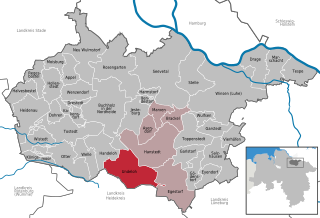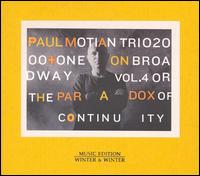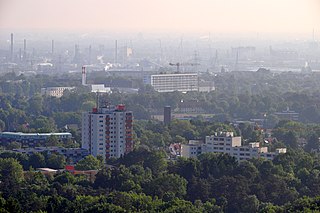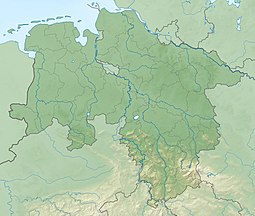
Harburg is a district (Landkreis) in Lower Saxony, Germany. It takes its name from the town of Harburg upon Elbe, which used to be the capital of the district but is now part of Hamburg. It is bounded by the districts of Lüneburg, Heidekreis, Rotenburg and Stade, by the City of Hamburg and the State of Schleswig-Holstein.

Edgar Yipsel Harburg was an American popular song lyricist and librettist who worked with many well-known composers. He wrote the lyrics to the standards "Brother, Can You Spare a Dime?", "April in Paris", and "It's Only a Paper Moon", as well as all of the songs for the film The Wizard of Oz, including "Over the Rainbow". He was known for the social commentary of his lyrics, as well as his liberal sensibilities. He championed racial and gender equality and union politics. He also was an ardent critic of religion.

Harburg is a borough of the city of Hamburg, Germany. It is also the name of a quarter in this borough, which used to be the capital of the district in Lower Saxony. The borough of Harburg lies on the southern banks of the river Elbe and covers parts of the port of Hamburg as well as residential and rural areas. It had a population of 163,771 as of 2016.

Harold Arlen was an American composer of popular music, who composed over 500 songs, a number of which have become known worldwide. In addition to composing the songs for the 1939 film The Wizard of Oz, including "Over the Rainbow", Arlen is a highly regarded contributor to the Great American Songbook. "Over the Rainbow" was voted the 20th century's No. 1 song by the Recording Industry Association of America (RIAA) and the National Endowment for the Arts (NEA).

Harburg is a town in Bavaria, in the Donau-Ries district. It is situated on the Wörnitz River.

The Province of Hanover was a province of the Kingdom of Prussia and the Free State of Prussia from 1868 to 1946.

Neu Wulmstorf (help·info) is a municipality ('Einheitsgemeinde') in the district of Harburg, in Lower Saxony, Germany. It changed its name on December 11, 1964 from ″Wulmstorf″ to ″Neu Wulmstorf″. It is part of the Hamburg Metropolitan Region.

The Man I Love is an album by jazz singer Peggy Lee with an orchestra arranged by Nelson Riddle and conducted by Frank Sinatra. This was Lee's first album after returning to Capitol.

Wilhelmsburg is a quarter (Stadtteil) of Hamburg, Germany within the borough (Bezirk) of Hamburg-Mitte. It is situated on several islands between the Northern and Southern branches of the Elbe river, together with the other quarters of Steinwerder, Veddel and Kleiner Grasbrook. The latter almost exclusively consists of facilities of the port of Hamburg. In 2016 the population was 55,074.

Undeloh is a village in the district of Harburg, in Lower Saxony, Germany.

Neugraben-Fischbek (help·info) is a quarter of Hamburg, Germany belongs to the borough Harburg. The quarter consists of the old settlements Neugraben and Fischbek, and the more recently constructed area Neuwiedenthal.

Hamburg-Harburg or Harburg is one of four operational main-line railway stations (Fernbahnhöfe) in the city of Hamburg, Germany. Opened on 1 May 1897, it is situated on the Hannover-Hamburg, Wanne-Eickel-Hamburg and Lower Elbe lines as well as the Harburg S-Bahn line. Train services are operated by Deutsche Bahn and Metronom with the rapid transit station being served by the Hamburg S-Bahn. The station is managed by DB Station&Service.

The Harburg Hills are a low ridge in the northeastern part of the German state of Lower Saxony and the southern part of the city state of Hamburg. They are up to 155 metres (509 ft) high.

Harburg (help·info) is a quarter (Stadtteil) in the homonymous borough (Bezirk) of Hamburg, Germany. It used to be the capital of the district in Lower Saxony. In 2016, the population was 26,098.

The Harburg S-Bahn line is a railway line in southern Hamburg, Germany. It starts at Hamburg Hauptbahnhof and runs via Harburg to Stade. It mostly runs parallel with the line to Hanover and the Lower Elbe line and is now part of the Hamburg S-Bahn lines S3 and S31.

On Broadway Vol. 4 or The Paradox of Continuity is an album by Paul Motian and the Trio 2000 + One released on the German Winter & Winter label in 2006. The album follows on from the first three volumes of Motian's On Broadway Series featuring features performances of Broadway show tunes.

The Hasselbrack, at 116.2 m above NN, is the highest point in the state of Hamburg, Germany.

Eißendorf is a quarter of Hamburg, Germany, in the borough of Harburg. More than 24,300 inhabitants live in an area of 8.4 km2.

Hamburg Bergedorf – Harburg is an electoral constituency represented in the Bundestag. It elects one member via first-past-the-post voting. Under the current constituency numbering system, it is designated as constituency 23. It is located in southern Hamburg, comprising the boroughs of Bergedorf and Harburg, as well as the quarter of Wilhelmsburg from Hamburg-Mitte.


















